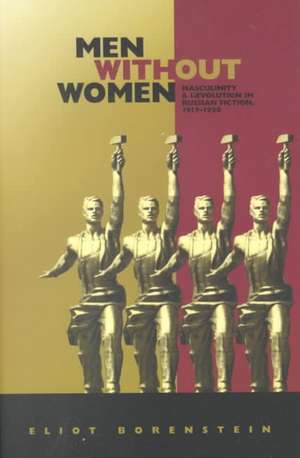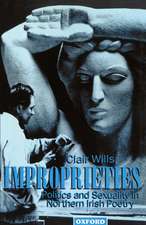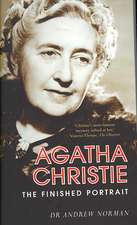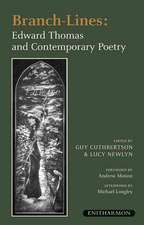Men without Women – Masculinity and Revolution in Russian Fiction, 1917–1929
Autor Eliot Borensteinen Limba Engleză Paperback – 23 ian 2001
In such works as Red Cavalry by Isaac Babel, Envy by Yuri Olesha, and Chevengur by Andrei Platanov women are either absent or transformed into bodiless abstractions. Their absence, claims Borenstein, reflects the masculine values that are hallmarks of the post-revolutionary era: production rather than reproduction, participation in history rather than domestic ahistoricity, heavy industry, construction, and struggle. He identifies in this literature groups of Men without Women replacing the family, even while the metaphor of family is used as an organising feature of their recurring revolutionary missions. With the passage of time, these characters' relationships-just as those in the Soviet culture of the time-begin to resemble the family structure that was originally rejected and destroyed, with one important exception: the new "families" had no place for women. According to Borenstein, this masculinist myth found its most congenial audience during the early period of communism, but its hostility to women and family ties could not survive into the Stalinist era when women, home, and family were no longer seen as antithetical to socialism.
Drawing on the theory and writings of Levi-Strauss, Girard, Sedgwick, and others, Men without Women will be of interest to students and scholars of Slavic literature and history as well as specialists in literary theory and gender studies.
Preț: 300.83 lei
Nou
Puncte Express: 451
Preț estimativ în valută:
57.56€ • 60.25$ • 47.91£
57.56€ • 60.25$ • 47.91£
Carte tipărită la comandă
Livrare economică 31 martie-14 aprilie
Preluare comenzi: 021 569.72.76
Specificații
ISBN-13: 9780822325925
ISBN-10: 0822325926
Pagini: 368
Dimensiuni: 150 x 250 x 15 mm
Greutate: 0.49 kg
Ediția:New.
Editura: MD – Duke University Press
ISBN-10: 0822325926
Pagini: 368
Dimensiuni: 150 x 250 x 15 mm
Greutate: 0.49 kg
Ediția:New.
Editura: MD – Duke University Press
Recenzii
"Teeming with insights, tightly argued, and written with stylish verve, Men Without Women is a splendid study of three key figures in the context of early Soviet prose: Platonov, Babel, and Olesha. By taking gender into meaningful account Borenstein deftly constructs a nuanced and original perspective, nicely grounded in the era's history and ideology, from which to read Russian fiction and society of the 1920s. In addition to being a 'must' for Slavists, this seductive volume abounds in pleasures of the text." - Helena Goscilo, University of Pittsburgh
"Well versed in theory and thoroughly knowledgeable about Russian political and cultural life, Borenstein provides an excellent contribution to the burgeoning field of gender studies in Russian and Soviet literatures." - Adele Barker, University of Arizona
"His readings of individual texts are very strong, scrupulously researched, and theoretically well - informed." - Beth Holmgren, University of North Carolina at Chapel Hill
"Teeming with insights, tightly argued, and written with stylish verve, Men Without Women is a splendid study of three key figures in the context of early Soviet prose: Platonov, Babel, and Olesha. By taking gender into meaningful account Borenstein deftly constructs a nuanced and original perspective, nicely grounded in the era's history and ideology, from which to read Russian fiction and society of the 1920s. In addition to being a 'must' for Slavists, this seductive volume abounds in pleasures of the text." - Helena Goscilo, University of Pittsburgh "Well versed in theory and thoroughly knowledgeable about Russian political and cultural life, Borenstein provides an excellent contribution to the burgeoning field of gender studies in Russian and Soviet literatures." - Adele Barker, University of Arizona "His readings of individual texts are very strong, scrupulously researched, and theoretically well - informed." - Beth Holmgren, University of North Carolina at Chapel Hill
"Well versed in theory and thoroughly knowledgeable about Russian political and cultural life, Borenstein provides an excellent contribution to the burgeoning field of gender studies in Russian and Soviet literatures." - Adele Barker, University of Arizona
"His readings of individual texts are very strong, scrupulously researched, and theoretically well - informed." - Beth Holmgren, University of North Carolina at Chapel Hill
"Teeming with insights, tightly argued, and written with stylish verve, Men Without Women is a splendid study of three key figures in the context of early Soviet prose: Platonov, Babel, and Olesha. By taking gender into meaningful account Borenstein deftly constructs a nuanced and original perspective, nicely grounded in the era's history and ideology, from which to read Russian fiction and society of the 1920s. In addition to being a 'must' for Slavists, this seductive volume abounds in pleasures of the text." - Helena Goscilo, University of Pittsburgh "Well versed in theory and thoroughly knowledgeable about Russian political and cultural life, Borenstein provides an excellent contribution to the burgeoning field of gender studies in Russian and Soviet literatures." - Adele Barker, University of Arizona "His readings of individual texts are very strong, scrupulously researched, and theoretically well - informed." - Beth Holmgren, University of North Carolina at Chapel Hill
Notă biografică
Textul de pe ultima copertă
"Well versed in theory and thoroughly knowledgeable about Russian political and cultural life, Borenstein provides an excellent contribution to the burgeoning field of gender studies in Russian and Soviet literatures."--Adele Barker, University of Arizona
Cuprins
Acknowledgments ix
Note on Translations and Translitereation xiii
Introduction: Brothers and Comrades 1
Chapter One
>Chapter Two
>Chapter Three
>Chapter Four
>Chapter Five
>Chapter Six
>Conclusion
>Notes 277
Works Cited 327
Index 341
Note on Translations and Translitereation xiii
Introduction: Brothers and Comrades 1
Chapter One
>Chapter Two
>Chapter Three
>Chapter Four
>Chapter Five
>Chapter Six
>Conclusion
>Notes 277
Works Cited 327
Index 341
Descriere
An analysis of the construction of masculinity in early Soviet culture that finds in the novels of Babel and others an utopian society composed exclusively of men.














